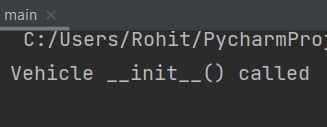The super() doesn’t know what class it’s being called in. we have to tell it which class’s parent’s function want to get. It is called a super argument in Python.
Python super arguments example
Simple example code in Python 3 works:- create a Vehicle class and want also to have a Car a class derived from it that calls the parent constructor.
class Vehicle:
def __init__(self):
print('Vehicle __init__() called')
class Car(Vehicle):
def __init__(self):
super().__init__()
car = Car()Output:

Source: stackoverflow.com
Python multiple inheritance passing arguments to constructors using super
When dealing with multiple inheritances in general, your base classes should be designed for multiple inheritances.
class A(object):
def __init__(self,a):
self.a=a
class B(A):
def __init__(self,b,**kw):
self.b=b
super(B,self).__init__(**kw)
class C(A):
def __init__(self,c,**kw):
self.c=c
super(C,self).__init__(**kw)
class D(B,C):
def __init__(self,a,b,c,d):
super(D,self).__init__(a=a,b=b,c=c)
self.d=dPlease comment if you have any doubts or suggestions on this Python super topic.
Note: IDE: PyCharm 2021.3.3 (Community Edition)
Windows 10
Python 3.10.1
All Python Examples are in Python 3, so Maybe its different from python 2 or upgraded versions.